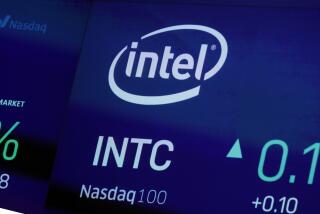Supreme Court to Consider Intel Case
- Share via
The U.S. Supreme Court said Monday that it would intervene in a dispute between chip giants Intel Corp. and Advanced Micro Devices Inc. over when a company can be forced to share secret documents with foreign regulators.
Intel, the world’s biggest computer chip maker, is trying to beat back an attempt by rival AMD to get its hands on confidential Intel documents and pass them along to antitrust enforcers at the European Commission.
AMD says the documents will bolster its claim that Intel uses anti-competitive tactics -- such as illegal rebates, withholding technical information and threatening computer makers that use AMD products -- to protect its market share in Europe.
“The documents we’re after may or may not have useful evidence on that subject,” said Patrick Lynch, an attorney with O’Melveny & Myers in Los Angeles who is representing AMD.
Intel, which has more than 80% of the world chip market, wants to keep the documents to itself. The Bush administration and the European Commission agree that Intel should not have to turn over its documents. The U.S. Chamber of Commerce and the U.S. National Assn. of Manufacturers have filed friend-of-the-court briefs in support of the Santa Clara, Calif., company.
The case dates to October 2000, when Sunnyvale, Calif.-based AMD filed a complaint with the European Commission, the executive arm of the 15-country European Union, alleging unfair practices by Intel.
The commission concluded in February 2002 that AMD’s complaint was unfounded and didn’t ask for any more evidence. But AMD had already filed a motion in U.S. District Court in San Jose, seeking to obtain documents from an earlier antitrust case filed against Intel by Intergraph Corp., a Huntsville, Ala., company that used to design computer chips. Hundreds of thousands of documents relating to Intel were sealed when that case was dismissed by an Alabama court in 2000.
The district court ruled against AMD, but the U.S. 9th Circuit Court of Appeals in San Francisco overturned the decision. Intel then appealed to the Supreme Court, saying it needs to protect its confidential and competitive information.
“We argued that the European Commission is an administrative group and not a court,” said Intel spokesman Chuck Mulloy.
The case reflects the increasingly global nature of antitrust cases, said Spencer Waller, a professor of antitrust and international trade at Loyola University Chicago’s School of Law.
“The most important antitrust cases tend to have an international element these days,” he said.
AMD said it hoped for a quick resolution that would grant it access to documents from the Intergraph case that, according to AMD, would demonstrate that Intel abuses its overwhelming dominance in computer microprocessors.
In its filing to the Supreme Court, Intel argued that a company shouldn’t be able to demand documents that the foreign tribunal itself isn’t seeking.
Supreme Court Justice Sandra Day O’Connor has recused herself from hearing the case. She said in her financial disclosure report for last year that she owned up to $15,000 in Intel stock.
Intel shares fell 48 cents to $33.39 on Nasdaq, while AMD shares fell 19 cents to $16.82 on the New York Stock Exchange.
Times wire services were used in compiling this report.
More to Read
Inside the business of entertainment
The Wide Shot brings you news, analysis and insights on everything from streaming wars to production — and what it all means for the future.
You may occasionally receive promotional content from the Los Angeles Times.










